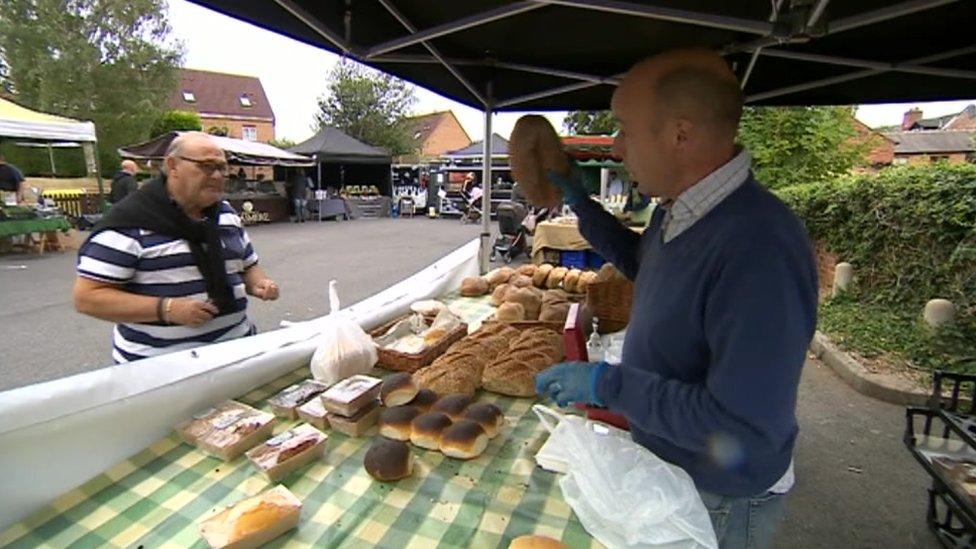Why do medieval royal charters still control us?
- Published
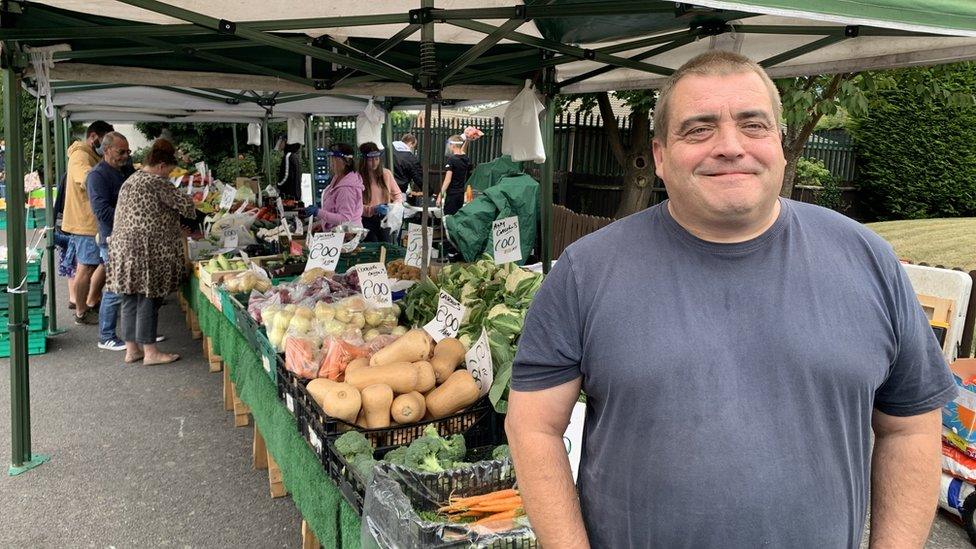
Steve Smith came up with the idea to allow people to shop locally during the lockdown
A royal charter was used to stop a pop-up market in Leicestershire this month. What are they and why do we still adhere to them?
It seemed like a win-win situation when a weekly lockdown market was set up in a pub car park in the village of Sileby.
Traders had somewhere to sell their goods in uncertain times and residents flocked to the scene to take their pick from oranges, spuds, carrots and other fresh items.
And when the pub was able to reopen it reported higher takings on market days.
But joy turned to frustration when word came through that Charnwood Borough Council would not allow the market to continue.
The authority cited a charter signed by Henry III in the 13th Century blocking any market being set up within six miles and two thirds (10.8km) of the nearby town of Loughborough - to protect the exclusivity of Loughborough's own market.
After discussions, the council eventually allowed the market to reopen - but only if it halved the number of stalls.
It left many wondering how an obscure 800-year-old rule could still play such a decisive role in modern life.
What are royal charters?

King Henry III granted Loughborough Market's charter in 1221
According to the Privy Council, external, the granting of royal charters began in the 13th Century as a way of establishing corporations and defining their privileges and purpose.
Each would be considered and then signed off by the reigning monarch - something that has continued ever since.
Loughborough Market's charter was granted to the Lord of the Manor by Henry III in 1221 and reconfirmed in 1227.
In justifying its use of the charter, Charnwood Borough Council said it remained a legally-recognised power and failure to enforce it could weaken its ability to stop other rival markets popping up in the future.
"Markets have always been huge sources of revenue," said Dr Natasha Hodgson, a historian at Nottingham Trent University.
"The idea is that if you own the land, you can give someone permission to set up a market and you can then take some revenue from it - which is why the lords, and then the kings, became particularly interested in the benefits of running markets.
"Then you also want to make sure your market makes the most money so you want to stamp out the competition."
How many royal charters are there?
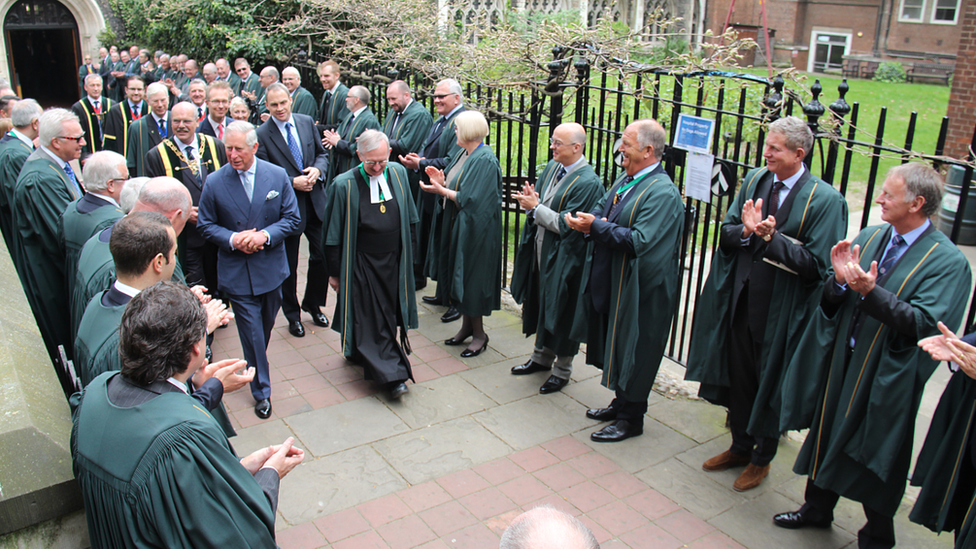
Prince Charles delivered the royal charter to the Worshipful Company of Hackney Carriage Drivers
At least 1,000, according to the Privy Council, which has published a list of them, external, though it acknowledges it may be incomplete.
Beneficiaries of the earliest charters included the Universities of Cambridge and Oxford (1231 and 1248), Winchester College and the Merchant Taylors' Company, external.
The Privy Council said nowadays charters were usually only given to bodies that worked in the public interest, such as charities and professional institutions.
Examples of charters granted this century include those for the Chartered Institute of Fundraising, The Royal Photographic Society of Great Britain and the Worshipful Company of Hackney Carriage Drivers.
Why does Loughborough Market's charter give such a precise figure?
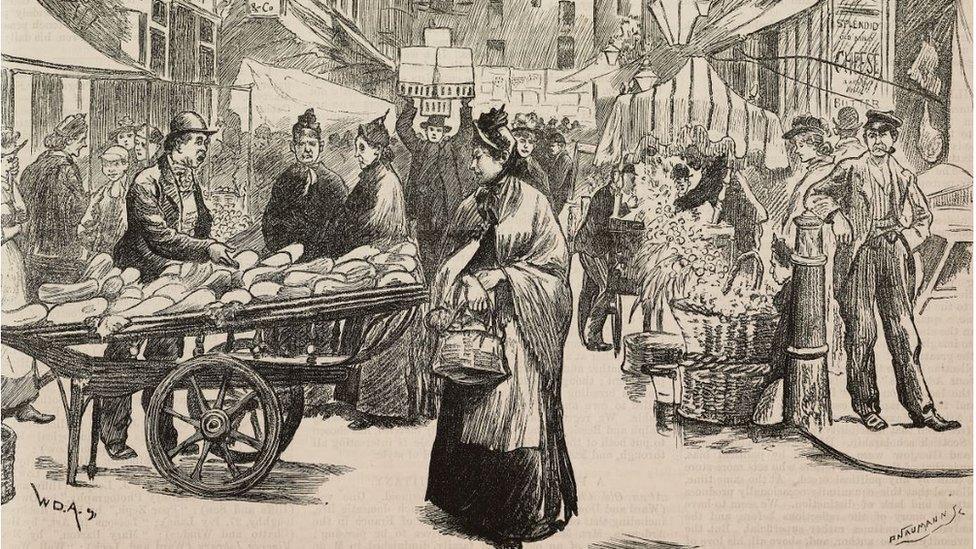
The rule relates to the distance it took to travel to a market and home again
NABMA - which represents the interests of British markets - said the rule stating markets could not open within six and two-thirds miles of the market it protected sat "at the heart of the law relating to market rights".
It said the oddly precise measurement came from carving 20 miles - considered a reasonable distance for someone going to market to cover in a day - into three parts.
These were: travelling to the market, walking around the market and then travelling home again.
It said the six and two-thirds miles limit would be measured in a straight line.
How are charters used now?
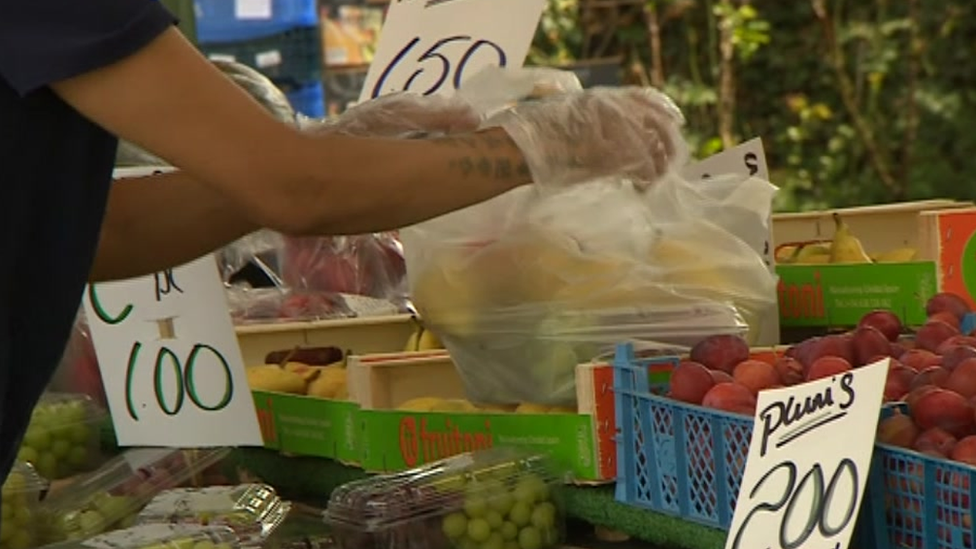
The lockdown market featured an array of fruit and vegetables
Prof John Beckett, a historian at the University of Nottingham, said: "Today they tend to get used by nimbies [an acronym for Not In My Back Yard] who discover a charter still exists.
"Many have been entirely forgotten but unless they have been revoked for some reason - and I have no idea how many came under this heading - they still exist."
Dr Hodgson said although it was unclear how a royal charter would fare if challenged in court, they provided a useful tool for councils to stop developments they had concerns about.
"For a variety of reasons there must be some concerns about impromptu markets - regulations that have to be followed on health and safety - all those kinds of things that the council needs to be involved in," she said.
"It may not stand up in a court of law in the long-run but it's an initial way of putting the brakes on something you don't want to be happening.
"But it's certainly a different situation to the medieval period when that extra money was going into the pocket of the lord, or possibly the local bishop.
"Back then it was literally a source of financial revenue they were concerned about but I think there'd be slightly more to it these days."
The market traders in Loughborough said they felt the charter was important to safeguard their businesses during "very difficult times".
Trader John Ashford said: "Charters are still used around the country to stop rival markets setting up and damaging local markets such as Loughborough."
How often do they crop up?
Charnwood Borough Council said it was "duty-bound" to enforce the charter and had done so on "several occasions" in the past to prevent rival markets setting up.
A similar charter in Leicester was branded "outdated" in 2006 by the leader of Blaby District Council, who complained it was preventing farmers markets taking place in his area, external.
But such events have been quite rare - which perhaps explains why the Sileby row made headlines.
What has the borough council said?
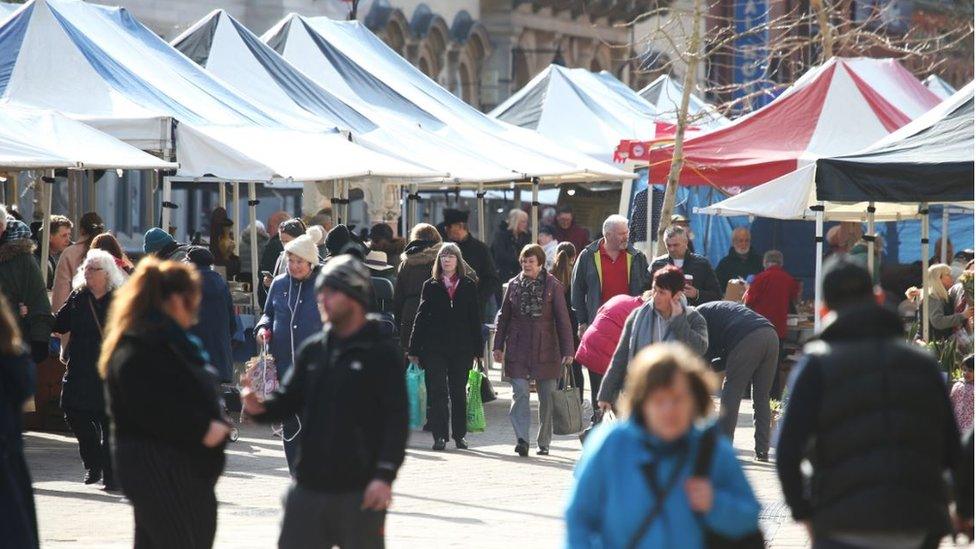
Loughborough Market has been around for 799 years
Charnwood Borough Council has stood by its decision to adhere to Loughborough Market's royal charter.
A spokeswoman said: "The principle of these charters is to stop rival markets setting up in the area and damaging Loughborough Market.
"If we did not enforce the charter, it could set a precedent and leave us unable to prevent markets popping up in other locations.
"We look after our market because it has been around for 799 years, it is part of the town's tradition and its traders make their living from it.
"It's also worth noting that we have used the market charter on several occasions before to prevent rival markets from setting up in the area."

Follow BBC East Midlands on Facebook, external, Twitter, external, or Instagram, external. Send your story ideas to eastmidsnews@bbc.co.uk.
- Published11 August 2020

- Published14 August 2020
